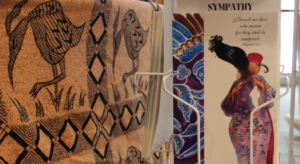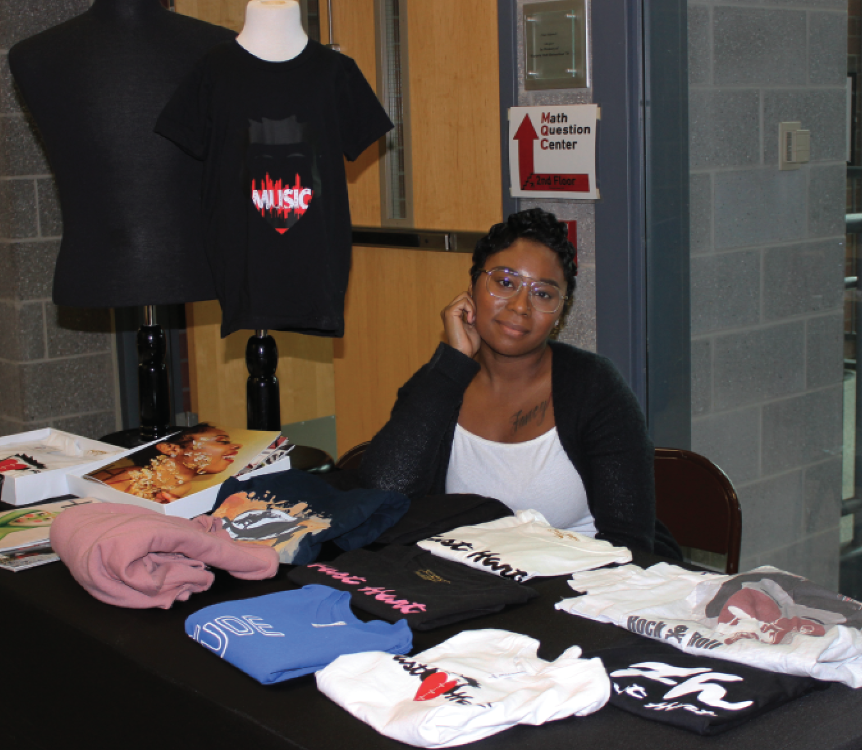
Ayanna Totten
Staff Writer
In honor of Black History Month, the Office of Multicultural Affairs (OMA) hosted ESU’s first Black Wall Street Expo at the Science and Technology Center on Feb. 23.
Local black-owned businesses had the opportunity to meet the community and display their merchandise, which ranged from apparel, accessories and beauty products, to art and literature.
Rooted in a history of racial violence and domestic terrorism, Black Wall Street is far from a figment of the imagination. Greenwood District in Tulsa, Okla., also known as Black Wall Street, was one of the most successful African-American communities in the United States.
The streets were lined with banks, hotels and cafes, and a dollar circulated the community 36 to 100 times.
On May 31, 1921, the Tulsa Tribune accused a black man, Dick Rowland, of trying to rape a white woman, Sarah Page. Despite an ongoing investigation, the news incited two days of riots by armed mobs of white residents.
Thirty-five city blocks were engulfed in flames, 300 people died, 800 people were injured and 9,000 lost their homes.
Nearly a century later, black business owners understand the value of supporting each other more than ever.
[SlideDeck id=14243]
Click to explore each vendor’s products.
Two alumni returned to their alma mater for the Black Wall Street Expo.
Karen Raptakis graduated in December 2017 with a degree in art and design, and she currently works in the business management department.
Realizing a need for diversity in the marketplace, she started a line of greeting cards called “It’s a Sista Thing.”
While financial concerns are an issue and Raptakis is trying to determine whether her business needs to be reinvented, she remains determined to invest her heart and soul into her cards.
“People don’t take you seriously as a black business owner,” she said. “As black people, we have to remember where our people really came from, how much they did not have and then bring someone else along with us.”
Zantaya Sealey, a 2018 graduate who studied graphic design and fine arts, established her business, Fast Hart in 2016.
Fast Hart began as a clothing line, but Sealey later created a magazine in 2018 to increase exposure and help her network.
The magazine has now become a platform to connect other artists and business owners.
Sealey expressed that getting people to purchase her products instead of name brand clothing is a challenge.
She emphasized the importance of black business owners working together to achieve a common goal and build an empire that can compete with well-established brands.
Current students also presented their start-ups at the Black Wall Street Expo.
Senior Robin Lewis transformed her hobby into Robin’s Versatile Creations. She paints and draws custom orders, and she recently started creating digital designs.

Greeting cards made by Karen Raptakis of Karen & Company Greeting Cards.
As a resident assistant juggling four jobs, Lewis started painting during her sophomore year to relieve stress. She eventually saw a business opportunity, and now her paintings are often inspired by dreams.
In addition to competition and a lack of motivation, Lewis stated that like others, she’ll have to overcome the negative and unprofessional perception of black businesses.
“If we don’t support each other, no one else will,” she said.
New to campus and the business world, freshman James Moore (Hamez) showcased three items from his clothing line, Hamez Customs.
Moore, who has always had an interest in drawing and fashion, hand-paints designs on jeans and jackets. The concept originated from a YouTube tutorial he watched in the tenth grade, which instructed viewers how to paint a phrase on the back of a flannel shirt.
Moore did the same to one of his shirts, and when he wore it to school, he received multiple compliments and Instagram likes. He hasn’t stopped since.
“I don’t feel like anybody owes me anything,” said Moore. “People don’t owe me the support. I have to give them reasons to want to support me.”
Still, he believes that if black businesses fail to support each other, widespread success is impossible.
Other businesses included Paparazzi, Makeup Yonnie and Jesus the Christ Church.
Theresa Spencer, a Paparazzi Independent Consultant, sells nickel and lead-free jewelry for $5.
Pastor Henry Brown Sr. and Reverend Ronald Moore Sr. attended the expo on behalf of Jesus the Christ Church. While some may not associate church with business, Brown explained that like other business owners, founder Dr. Bishop William Lee faced his share of challenges.
Jesus the Christ Church began in a New York train station, and when Bishop Lee transitioned to Stroudsburg, he had to jump over hurdles of denials and permits to officially secure a space.
Umir Ortiz represented Makeup Yonnie for his best friend, Minyon Woods. Woods is currently in the military overseas, but she has a lifelong passion for makeup and started her business while she was enlisted.
Available products include highlights, color lip gloss, 3D mink lashes and makeup brushes with synthetic bristles.
The highlights are geared toward black and brown skin, and all products have a unique name as a signature touch. A highlighter named Skeet 22 is in honor of Woods and Ortiz’s 22-year-old friend, Skeet, who was recently shot to death.
“We need to help each other…a lot of the time, we fight against each other,” said Spencer.
“If we don’t support each other, then nobody else is going to support us…It all starts home,” stated Ortiz.
The vendor turnout was lower than expected, but the Black Wall Street Expo received a positive reception from students.
“I’ve been looking forward to this because on campus, we don’t really do things to show that we support black people or minorities in general…I feel like this is a good start,” said senior Sterling Francois.
Losena Kearse, a former OMA graduate student worker, organized the event with the program coordinator, Lyesha Fleming.
“What I really want from this is for ESU to have a positive light,” said Kearse.
Kearse was happy that every business was able to make a sale and receive publicity, but she’s already planning for next year and anticipating bigger and better vendors.
Email Ayanna at:
Atotten@live.esu.edu

